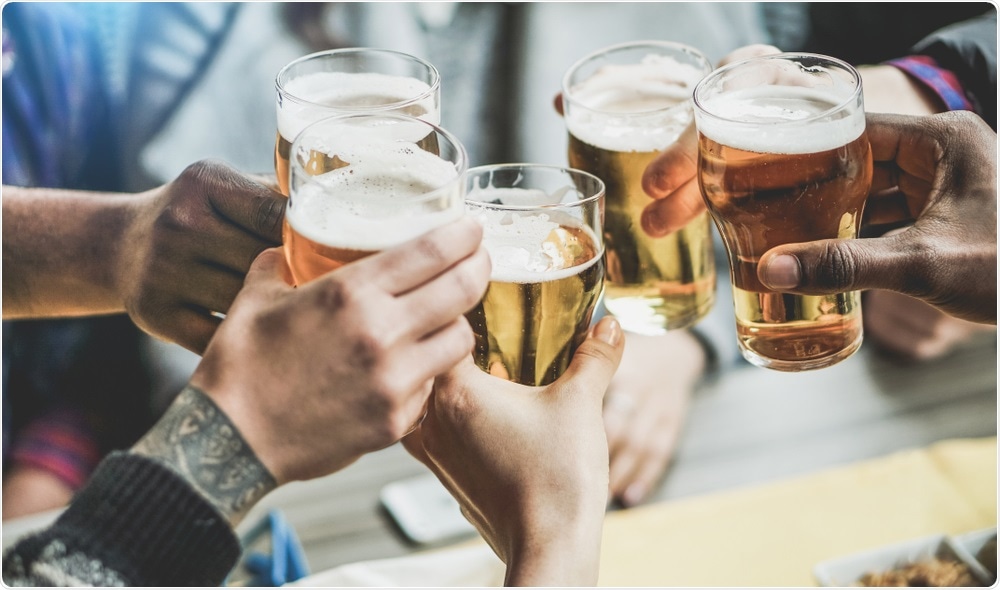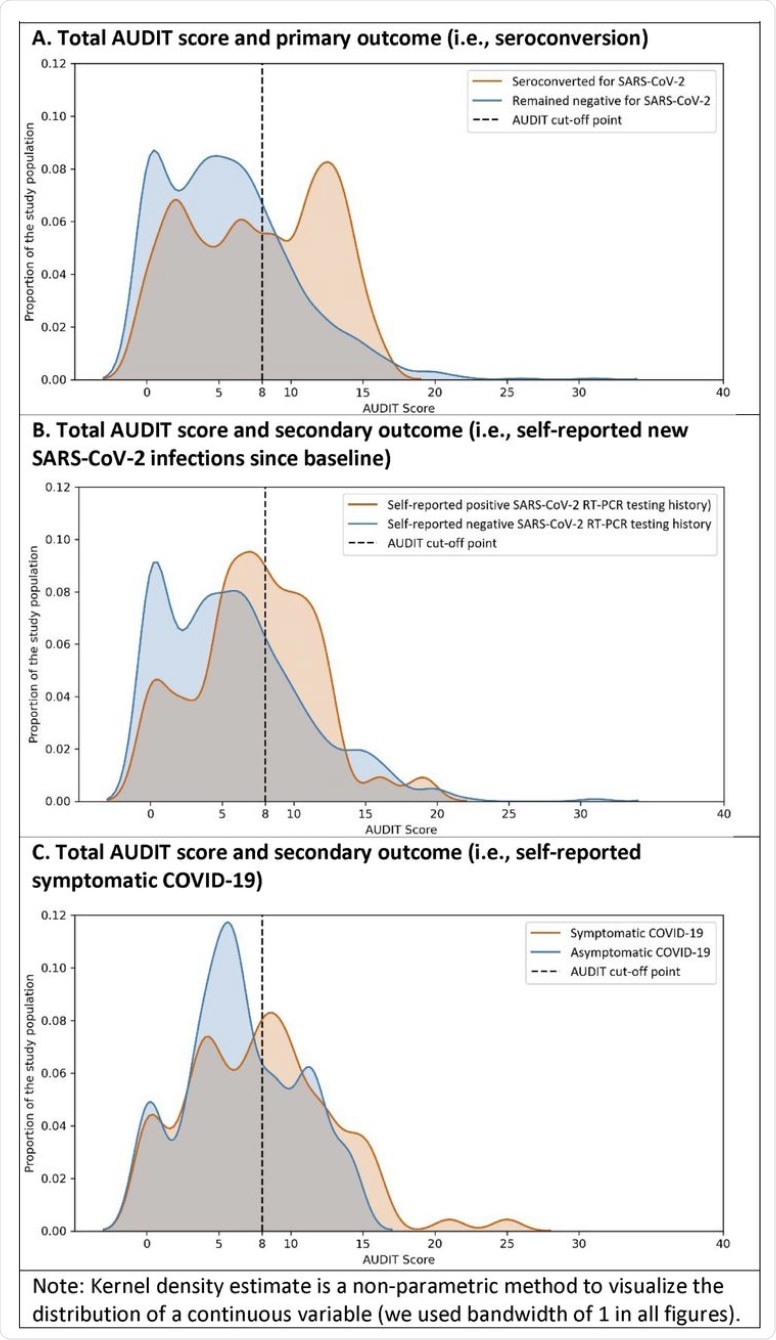The coronavirus disease 2019 (COVID-19), which is caused by the severe acute respiratory syndrome coronavirus 2 (SARS-CoV-2), has caused over 4.31 million deaths worldwide and infected over 204 million people. College campuses have been hard hit by this pandemic, with most having been closed down for months as health services were overwhelmed by the heavy caseload.
 Study: High-risk alcohol consumption may increase the risk of SARS-CoV-2 seroconversion: a prospective seroepidemiologic cohort study among American college students. Image Credit: DisobeyArt / Shutterstock.com
Study: High-risk alcohol consumption may increase the risk of SARS-CoV-2 seroconversion: a prospective seroepidemiologic cohort study among American college students. Image Credit: DisobeyArt / Shutterstock.com

 This news article was a review of a preliminary scientific report that had not undergone peer-review at the time of publication. Since its initial publication, the scientific report has now been peer reviewed and accepted for publication in a Scientific Journal. Links to the preliminary and peer-reviewed reports are available in the Sources section at the bottom of this article. View Sources
This news article was a review of a preliminary scientific report that had not undergone peer-review at the time of publication. Since its initial publication, the scientific report has now been peer reviewed and accepted for publication in a Scientific Journal. Links to the preliminary and peer-reviewed reports are available in the Sources section at the bottom of this article. View Sources
The relationship between COVID-19 and drinking
Approximately 700,000 COVID-19 cases have been reported on American campuses of higher education. Most cases were among students, with a resulting loss of attendance, physical and mental weakening, and poor academic performance. Such cases can also result in the transmission of COVID-19, both within and outside the campus, thus increasing the number of infections in the surrounding communities.
Earlier studies have shown that infections among college-age adults is linked to rises in the number of cases among older and more high-risk adults. The present study aimed to define the risk of infection among college students posed by high-risk drinking behaviors.
Drinking is very common among American college students, with 51% reporting that they drink alcohol and 24% admitting to binge drinking. Additionally, 6% of college students have described themselves as heavy drinkers.
How drinking affects the body
The result of heavy drinking is an increased risk of COVID-19, both by promoting chronic medical conditions and by increasing high-risk behaviors that could lead to greater exposure.
Cognitive alterations are known to accompany drinking, which can lead to an impaired understanding of information, reduced working memory, and more impulsive behaviors. This can easily lead to divergence from social distancing and other protective measures recommended for the control of COVID-19.
Again, since drinking is often a social activity, and alcohol increases distortions in thinking, this activity may lead to group behaviors that breach COVID-19-protective measures.
Physiologically, drinking slows down and reduces immune responses, both innate and adaptive, particularly when the body encounters respiratory pathogens. Both neutrophils and lymphocytes are reduced in count, which is accompanied by the weakening of the lung alveolar barrier.
Alcohol could also damage the lungs, thus predisposing these individuals to SARS-CoV-2 infection. Finally, alcohol may promote the onset of respiratory complications, such as pneumonia and acute respiratory distress syndrome, thereby worsening the outcome in these individuals.
The study aimed to explore the hypothesis that students who consumed large amounts of alcohol were more likely to experience SARS-CoV-2 seroconversion. Secondly, the researchers aimed to evaluate the association between high-risk alcohol consumption and self-reported positive SARS-CoV-2 reverse transcription-polymerase chain reaction (RT–PCR) testing history. Thirdly, the researchers examined the association between high-risk alcohol consumption and COVID-19-positive individuals experiencing symptoms of the disease.
Study details
The current study was carried out on the campus of Indiana University Bloomington (IUB). At the time of the study, several COVID-19 restrictions were in place for this university that has an undergraduate population of about 35,000. Data were obtained via an online survey and was supplemented with in-person testing for baseline antibody levels.
Follow-up surveys were carried out every fortnight for drinking quantity and frequency, followed by antibody testing at the end of the study. At the time of the last survey, participants were asked to report if they had tested positive for COVID-19 by RT-PCR during the study period.
What were the findings?
The researchers sought to quantify high-risk drinking by the Alcohol Use Disorders Identification Test (AUDIT) tool, with a score of 8 or more being the cut-off. Baseline demographic characteristics were also collected in the survey.
Almost 1,000 students were included in the current study. The median student age was 20, with 63% of participants being female and 77% identifying as white. An estimated 67% of the participants did not live on campus.
Birth sex, ethnic origin, year in school, residential location, and membership of Greek organizations were found to be risk factors for heavy drinking. In particular, white males in their senior year tended to drink more, as did those living off-campus and with a Greek organization membership. The median AUDIT score was 5, with 34% of participants classified as heavy drinkers.
The seroconversion rate was 5%, with the break-up being 9% and 4% among heavy drinkers and light/non-drinkers, respectively. Overall, 9% of participants who reported a positive RT-PCR had begun the study with a negative test. Among the individuals who self-reported that they had never tested positive for COVID-19, 75% reported symptomatic COVID-19 by the end of the survey.
The risk of seroconversion was thus 2.3 times higher among heavy drinkers as compared to others. The risk of a self-reported positive RT-PCR was almost doubled in this group. Symptomatic disease tended to be about 20% more likely in this group, even after adjusting for confounding factors.
In the follow-up surveys, the risk of seroconversion and self-reported infection in heavy drinkers was more than doubled relative to others. The scientists pointed out that a cut-off AUDIT score of 6 or above is required for significant associations.
 Kernel density estimates of AUDIT score by primary and secondary COVID-19 outcomes.
Kernel density estimates of AUDIT score by primary and secondary COVID-19 outcomes.
What are the implications?
The data presented here indicate that alcohol consumption may be an important risk factor in COVID-19 transmission on college campuses. While this is an under-researched area, these findings corroborate with previously published papers. In fact, one study reported that obese patients who drank excessively were at a higher risk of dying from COVID-19 as compared to non-obese patients.
Additionally, another study found that light drinking was instead protective against hospitalization for COVID-19. This latter finding was not observed in the current college student study.
The use of AUDIT scores ensured that the screening period was longer and sufficient to identify toxic patterns of drinking and chronic drinking that are linked to health consequences. The findings of a stronger association between the cut-off scores and seroconversion suggest a dose-response relationship between these two factors.
“Even though effective interventions to reduce high-risk alcohol consumption might take more time to be tested and implemented at individual level, university policy makers can use our findings to predict locations in college towns where transmission might be more likely to occur (e.g., college town bars or Greek houses) and implement COVID-19 protective measures (e.g., face mask wearing) in such places, in fall 2021.”

 This news article was a review of a preliminary scientific report that had not undergone peer-review at the time of publication. Since its initial publication, the scientific report has now been peer reviewed and accepted for publication in a Scientific Journal. Links to the preliminary and peer-reviewed reports are available in the Sources section at the bottom of this article. View Sources
This news article was a review of a preliminary scientific report that had not undergone peer-review at the time of publication. Since its initial publication, the scientific report has now been peer reviewed and accepted for publication in a Scientific Journal. Links to the preliminary and peer-reviewed reports are available in the Sources section at the bottom of this article. View Sources
Journal references:
- Preliminary scientific report.
Kianersi, S., Ludema, C., Macy, J. T., et al. (2021). High-risk alcohol consumption may increase the risk of SARS-CoV-2 seroconversion: a prospective seroepidemiologic cohort study among American college students. medRxiv. doi:10.1101/2021.08.03.21261444. https://www.medrxiv.org/content/10.1101/2021.08.03.21261444v1.
- Peer reviewed and published scientific report.
Kianersi, Sina, Christina Ludema, Jonathan T. Macy, Chen Chen, and Molly Rosenberg. 2022. “Relationship between High-Risk Alcohol Consumption and Severe Acute Respiratory Syndrome Coronavirus 2 (SARS-CoV-2) Seroconversion: A Prospective Sero-Epidemiological Cohort Study among American College Students.” Addiction 117 (7): 1908–19. https://doi.org/10.1111/add.15835. https://onlinelibrary.wiley.com/doi/10.1111/add.15835.